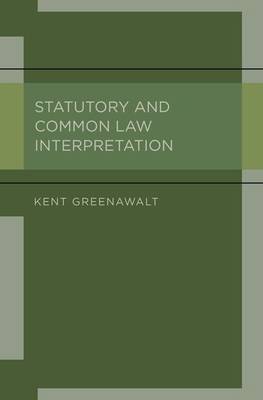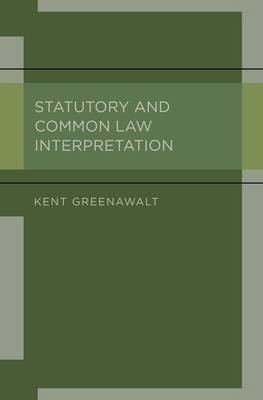
En raison d'une grêve chez bpost, votre commande pourrait être retardée. Vous avez besoin d’un livre rapidement ? Nos magasins vous accueillent à bras ouverts !
- Retrait gratuit dans votre magasin Club
- 7.000.000 titres dans notre catalogue
- Payer en toute sécurité
- Toujours un magasin près de chez vous
En raison de la grêve chez bpost, votre commande pourrait être retardée. Vous avez besoin d’un livre rapidement ? Nos magasins vous accueillent à bras ouverts !
- Retrait gratuit dans votre magasin Club
- 7.000.0000 titres dans notre catalogue
- Payer en toute sécurité
- Toujours un magasin près de chez vous
Description
As Kent Greenwalt's second volume on aspects of legal interpretation, this book analyzes statutory and common law interpretation and compares the two. In respect to statutory interpretation, it first asks whether judges are "faithful agents" of the legislature or "independent cooperative partners." It concludes that the obvious answer is that neither simple categorization really fits-that the function of judges involves a combination of roles. The next issue addressed is whether the intent of those in authority matters for interpreting the kinds of instructions contained in statutes. At the general level, the answer is "yes." This answer follows even if one thinks interpretation should concentrate on the understanding of readers, because readers themselves would treat intentions as part of the relevant context of the language of statutes. It would take some special reasons, such as constitutional structure or unreliability, to discount actual intents of legislators and use of legislative history. The book argues that none of these special reasons are convincing. On the question whether judges should focus on the language of specific provision or overall purpose, both are relevant, and purpose should become more important as time passes. In an analysis of various other features of statutory interpretation, the book claims that presidential signing statements should not have weight, that subsequent legislative actions short of new statutes should only occasionally carry importance, that "canons of interpretation," such as the rule of lenity, can provide some, limited, guidance, and that there are special reasons for courts to adhere to precedents in statutory cases, but these should not yield any absolute rule. A chapter on administrative interpretation of statutes claims that the standards agencies apply should differ to a degree from those of courts and that judicial deference to those interpretations is ordinarily warranted. The book's second part, on common law interpretation, considers the force of precedents, resisting any simple dichotomy between holding and dictum. It also defends the use of reasoning by analogy, not only in the initial stages thinking about a problem, but also in respect to some final justifications for decisions. An examination of the place of rules, principles, and policies argues that all three are relevant in common law interpretation; and shows that common law interpretation is not reducible to any formula. A final chapter compares statutory and common law interpretation, similarities and differences, how each can affect the other, and the significance of having a legal system in which they both play prominent roles.
Spécifications
Parties prenantes
- Auteur(s) :
- Editeur:
Contenu
- Nombre de pages :
- 408
- Langue:
- Anglais
Caractéristiques
- EAN:
- 9780199756148
- Date de parution :
- 12-11-12
- Format:
- Livre relié
- Format numérique:
- Genaaid
- Dimensions :
- 157 mm x 236 mm
- Poids :
- 657 g

Les avis
Nous publions uniquement les avis qui respectent les conditions requises. Consultez nos conditions pour les avis.






